What is the difference between freeze-dried and dehydrated foods? Awesome question! Before I seriously started working on our “home store,” I had no clue there was a difference! But it turns out that there are a lot of differences and those differences turned out to be incredibly important to my family. In fact, many of the problems I had with “food storage” were solved when I discovered freeze-dried foods. Suddenly “food storage” was healthy, tasted good, and could be easily rotated in my everyday recipes! I was excited.
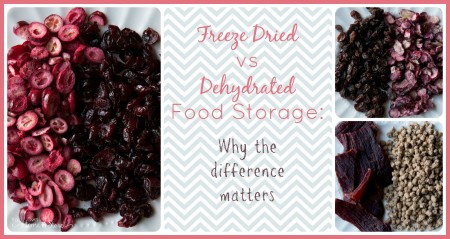
I’ve learned a lot about dehydrated and freeze-dried foods since early 2008 and I occasionally hold cooking classes to teach others what I’ve learned. During each and every cooking class I hold there are numerous people who use the words freeze-dried and dehydrated interchangeably. Based on that, I’m guessing there are a few of you….maybe lots of you….who are just like I was: surprised to find out there is a difference between freeze-dried and dehydrated foods and curious about what the difference is.
Freeze-Dried VS. Dehydrated Foods
The difference is actually pretty big! And it is very important to understand the difference when building a home store for your family. Over the last few years, I have consulted with many people who have had to throw away thousands of dollars in unusable food because they invested in the wrong thing in the first place. Don’t let that be you!
I have chosen to store nearly all freeze-dried foods in our family’s “home store” due to their greater versatility, nutrition, better taste, and usability. Use the chart below to determine what you feel would be best to store for your family:
| Freeze Dried | Dehydrated | |
|---|---|---|
| Process | The product is frozen, then placed under a vacuum which allows the water in the product to vaporize without passing through the liquid state. About 98% of the water is removed. | The product is heated and water is removed through evaporation. It is impossible to remove all the water. Depending on the process about 5%-30% of the water remains. |
Shelf Life | Very long (20-30 years) because of the lack of water left. | Shorter (1-8 years) because there is always some water left in the product. |
Additives | Since there is no water left in the product, no additives at all are needed in single-ingredient cans. For example, a can of peaches will have nothing but peaches in the can. When you start combining ingredients (as in freeze-dried just add water meals), additives and preservatives are needed. | Sugar, salt, or other preservatives are usually needed to maintain the shelf life because there is always some water left in the product. |
Nutrition | Retains all nutrients. Thrive freeze-dried product is naturally ripened and then flash frozen within hours so it can actually contain even more nutrients than artificially ripened produce found at the grocery store. | Many nutrients (up to 50%) are lost because of the heat applied during the dehydration process. |
Color, Taste, Texture | When hydrated, the color, taste, and texture are all very similar to the original product. Without hydration, the product is dry and can easily be crushed to powder. | Most dehydrated foods look and taste different from fresh product. (Beef Jerky vs Roast Beef or Raisins vs Grapes). They are pliable, stretchy, or chewy. |
Re-hydration | Very easy to re-hydrate in cold or hot water. When hydrated they are just like the fresh product would be after being frozen and thawed. | Difficult to re-hydrate (try turning a raisin into a grape or Beef Jerky into Roast Beef). For products that can be re-hydrated, it must be done with hot water and requires far more water than a freeze-dried product. Since the water must be hot, re-hydration requires fuel (which would be precious in a true emergency situation). |
Use in cooking/baking | Very easy to use in cooking and baking. Products are precooked and cut so all you do is add water. Little to no change in the end product vs using fresh ingredients. | Some products can be used in cooking or baking, but because of the change in texture caused by dehydration, not with as much ease or the same quality results as freeze-dried products. |
What Products | Almost anything can be freeze-dried including Fruits, Vegetables, Meat, Cheese, Yogurt, and even Ice cream! | Mostly fruits and vegetables. Some meats. |
Best Use | Hydrated in place of a fresh product in any recipe. Fruits and some veggies and even cheese are also fantastic as snacks. | Snacking |
The Difference Between Freeze-Dried and Dehydrated Foods in Pictures
A picture really does say a thousand words. Here are a few pictures that say far more than I ever could about the difference between dehydrated and freeze-dried foods. Especially note the differences in color and texture!
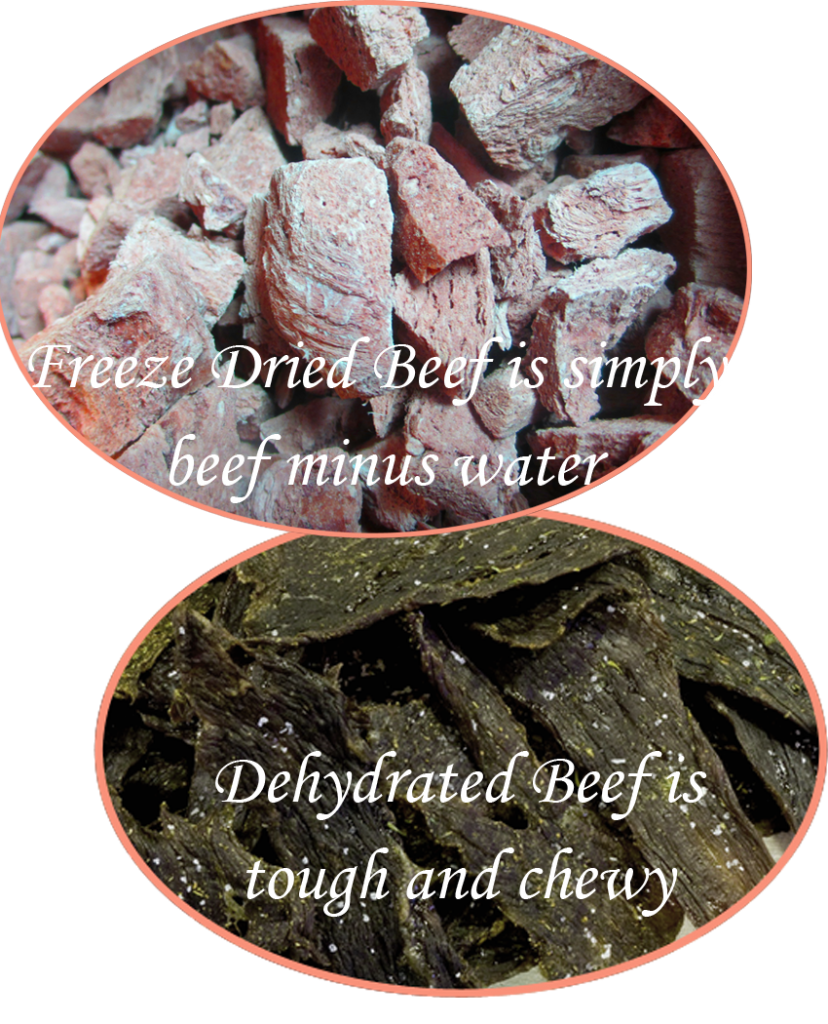
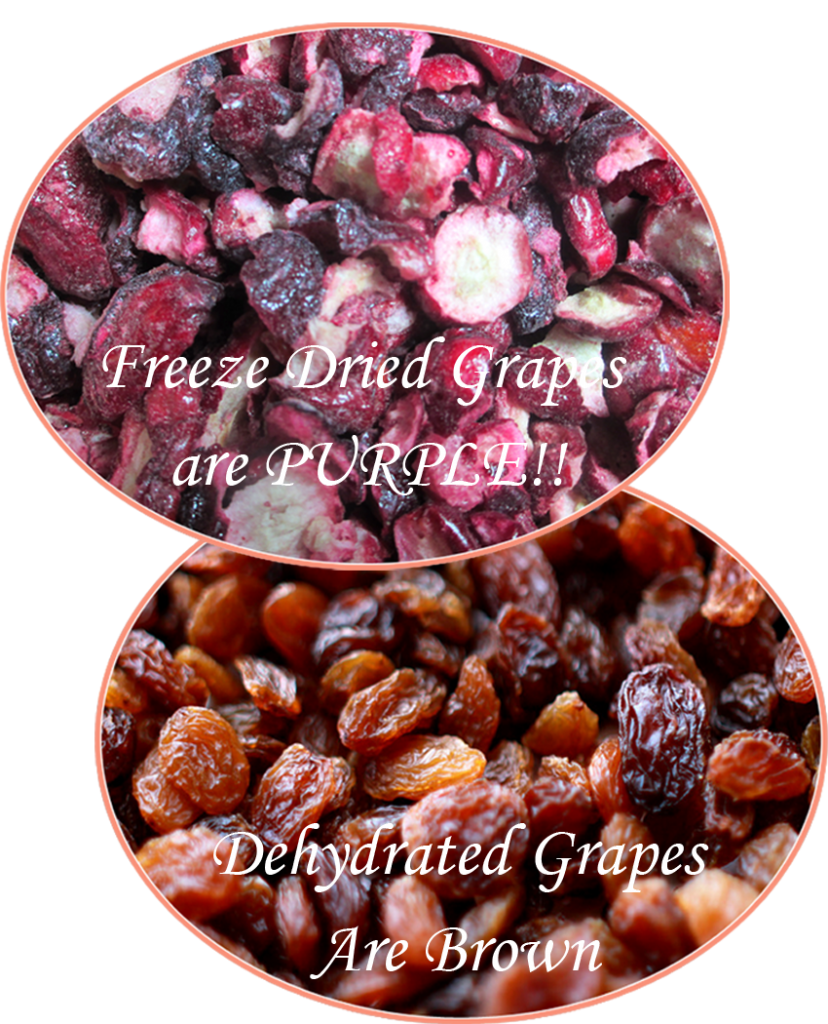
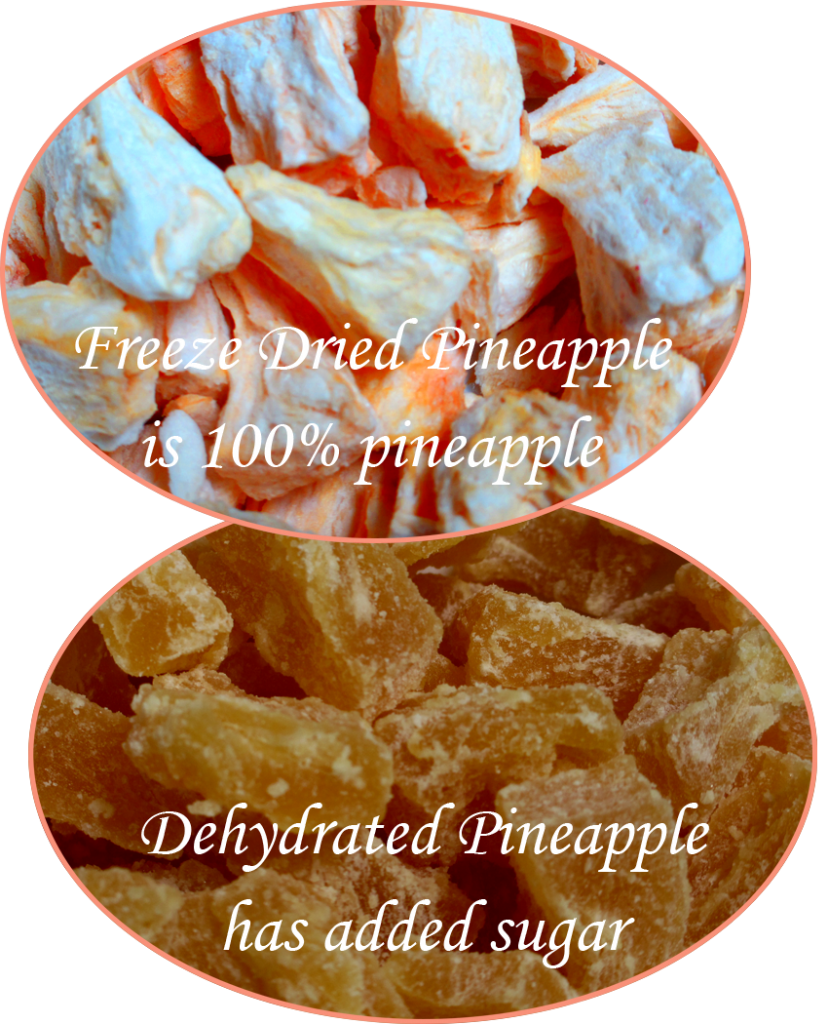
Freeze-Dried Foods Vs. Other Products
Comparing Freeze-Dried to Canned
I know some people also consider canned foods for their food storage. Well, canned is for dehydrated like dehydrated is freeze-dried. Canned foods have lots of heat applied, few nutrients, lots of additives, and very short shelf life (usually 1-3 years). Personally, I avoid them whenever possible.
Comparing Freeze-Dried to Grocery Store Produce
Many people ask how freeze-dried produce compares to the fresh produce they might buy at the grocery store. This graphic should answer that:

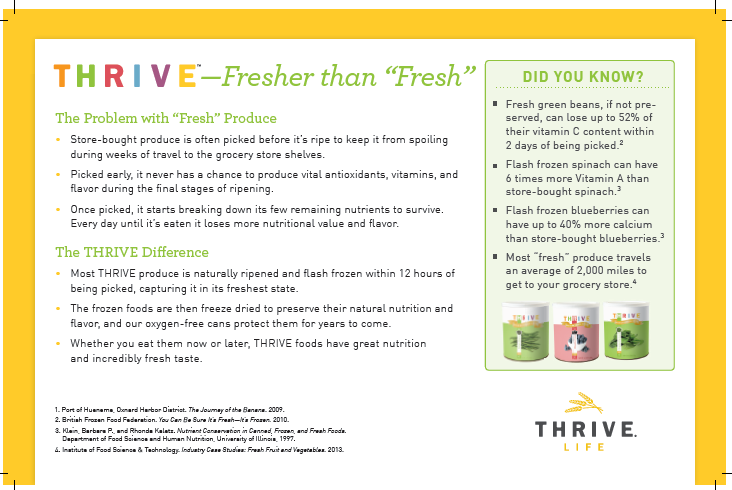
Where to Buy Freeze-Dried Products:
My favorite place to purchase freeze-dried produce is Thrive Life as their food has the most color and flavor, but you can also find freeze-dried food at Emergency Essentials and Augason Farms, and Honeyville.
So there you have it! The difference between freeze-dried, dehydrated, canned, and “fresh” produce! I’d love to hear about your experience or answer any questions you have. Just leave me a comment below!
Pin It Now For Later!
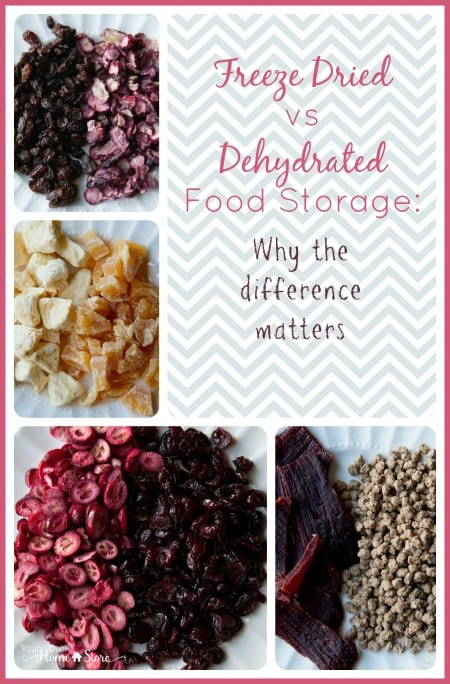
Becky is a wildlife enthusiast and pet and livestock care expert with a diploma in canine nutrition. With over a decade of experience in animal welfare, Becky lends her expertise to Simple Family Preparedness through insightful info about pets, livestock, bee keeping, and the practicalities of homesteading.


I have a question…are you saying when I put together a meal using all freeze dried foods ie: taco soup that It has to have additives and preservatives then?
Thank you
What about freeze drying your own instead of buying freeze dried?
You can, but it is very pricey. There is currently only one home machine out there. YOu can find more of my thoughts on that here: https://simplefamilypreparedness.com/harvest-right-home-freeze-dryer/
Thank you for the awesome information. 🙂
Yep!